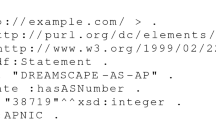Abstract
A rapidly increasing amount of data, information and knowledge is becoming available on the Web, often written in different formats and languages, adhering to standardizations driven by the World Wide Web Consortium initiative. Taking advantage of all this heterogeneous knowledge requires its integration for more sophisticated reasoning services and applications. To fully leverage the potential of such systems, their inferences should be accompanied by justifications that allow a user to understand a proposed decision/recommendation, in particular for critical systems (healthcare, law, finances, etc.). However, determining such justifications has commonly only been considered for a single formalism, such as relational databases, description logic ontologies, or declarative rule languages. In this paper, we present the first approach for providing provenance for heterogeneous knowledge bases building on the general framework of multi-context systems, as an abstract, but very expressive formalism to represent knowledge bases written in different formalisms and the flow of information between them. We also show under which conditions and how provenance information in this formalism can be computed.
Access this chapter
Tax calculation will be finalised at checkout
Purchases are for personal use only
Similar content being viewed by others
Notes
References
Baader, F., Calvanese, D., McGuinness, D.L., Nardi, D., Patel-Schneider, P.F. (eds.) The Description Logic Handbook. Cambridge University Press (2007)
Bourgaux, C., Ozaki, A., Peñaloza, R., Predoiu, L.: Provenance for the description logic \(\cal{ELH} ^r\). In: IJCAI, pp. 1862–1869. ijcai.org (2020)
Brewka, G., Eiter, T.: Equilibria in heterogeneous nonmonotonic multi-context systems. In: Proceedings of AAAI, pp. 385–390. AAAI Press (2007)
Brewka, G., Eiter, T., Truszczynski, M.: Answer set programming at a glance. Commun. ACM 54(12), 92–103 (2011)
Buneman, P.: The providence of provenance. In: Gottlob, G., Grasso, G., Olteanu, D., Schallhart, C. (eds.) BNCOD 2013. LNCS, vol. 7968, pp. 7–12. Springer, Heidelberg (2013). https://doi.org/10.1007/978-3-642-39467-6_3
Calvanese, D., Lanti, D., Ozaki, A., Peñaloza, R., Xiao, G.: Enriching ontology-based data access with provenance. In: IJCAI, pp. 1616–1623. ijcai.org (2019)
Damásio, C.V., Analyti, A., Antoniou, G.: Provenance for SPARQL queries. In: Cudré-Mauroux, P., et al. (eds.) ISWC 2012. LNCS, vol. 7649, pp. 625–640. Springer, Heidelberg (2012). https://doi.org/10.1007/978-3-642-35176-1_39
Viegas Damásio, C., Analyti, A., Antoniou, G.: Justifications for logic programming. In: Cabalar, P., Son, T.C. (eds.) LPNMR 2013. LNCS (LNAI), vol. 8148, pp. 530–542. Springer, Heidelberg (2013). https://doi.org/10.1007/978-3-642-40564-8_53
Dannert, K.M., Grädel, E., Naaf, M., Tannen, V.: Semiring provenance for fixed-point logic. In: CSL, LIPIcs, vol. 183, pp. 17:1–17:22 (2021)
Dividino, R.Q., Schenk, S., Sizov, S., Staab, S.: Provenance, trust, explanations - and all that other meta knowledge. KI 23(2), 24–30 (2009)
Eiter, T., Fink, M., Schüller, P., Weinzierl, A.: Finding explanations of inconsistency in multi-context systems. Artif. Intell. 216, 233–274 (2014)
Eiter, T., Ianni, G., Lukasiewicz, T., Schindlauer, R., Tompits, H.: Combining answer set programming with description logics for the semantic web. Artif. Intell. 172(12–13), 1495–1539 (2008)
Fandinno, J., Schulz, C.: Answering the “why" in answer set programming - a survey of explanation approaches. TPLP 19(2), 114–203 (2019)
Geerts, F., Poggi, A.: On database query languages for k-relations. J. Appl. Log. 8(2), 173–185 (2010)
Glavic, B.: Data provenance. Found. Trends Datab. 9(3–4), 209–441 (2021)
Glavic, B., Esmaili, K.S., Fischer, P.M., Tatbul, N.: Ariadne: managing fine-grained provenance on data streams. In: Proceedings of DEBS, pp. 39–50. ACM (2013)
Grädel, E., Tannen, V.: Semiring provenance for first-order model checking. arXiv preprint arXiv:1712.01980 (2017)
Green, T.J., Karvounarakis, G., Tannen, V.: Provenance semirings. In: Proceedings of PODS, pp. 31–40. ACM (2007)
Green, T.J., Tannen, V.: The semiring framework for database provenance. In: Proceedings of PODS, pp. 93–99. ACM (2017)
Horridge, M., Parsia, B., Sattler, U.: Laconic and precise justifications in OWL. In: Sheth, A., et al. (eds.) ISWC 2008. LNCS, vol. 5318, pp. 323–338. Springer, Heidelberg (2008). https://doi.org/10.1007/978-3-540-88564-1_21
Knorr, M., Alferes, J.J., Hitzler, P.: Local closed world reasoning with description logics under the well-founded semantics. Artif. Intell. 175(9–10), 1528–1554 (2011)
Knorr, M., Slota, M., Leite, J., Homola, M.: What if no hybrid reasoner is available? hybrid MKNF in multi-context systems. J. Log. Comput. 24(6), 1279–1311 (2014)
Lukumbuzya, S., Ortiz, M., Simkus, M.: Resilient logic programs: answer set programs challenged by ontologies. In: AAAI, pp. 2917–2924. AAAI Press (2020)
Motik, B., Rosati, R.: Reconciling description logics and rules. J. ACM 57(5), 93–154 (2010)
Tannen, V.: Provenance analysis for FOL model checking. ACM SIGLOG News 4(1), 24–36 (2017)
Acknowledgment
We thank the anonymous reviewers for their comments and FCT projects RIVER (PTDC/CCI-COM/30952/2017), FORGET (PTDC/CCI-INF/32219/2017), and NOVA LINCS (UIDB/04516/2020) for partial support.
Author information
Authors and Affiliations
Corresponding author
Editor information
Editors and Affiliations
Rights and permissions
Copyright information
© 2022 The Author(s), under exclusive license to Springer Nature Switzerland AG
About this paper
Cite this paper
Knorr, M., Damásio, C.V., Gonçalves, R., Leite, J. (2022). Towards Provenance in Heterogeneous Knowledge Bases. In: Gottlob, G., Inclezan, D., Maratea, M. (eds) Logic Programming and Nonmonotonic Reasoning. LPNMR 2022. Lecture Notes in Computer Science(), vol 13416. Springer, Cham. https://doi.org/10.1007/978-3-031-15707-3_22
Download citation
DOI: https://doi.org/10.1007/978-3-031-15707-3_22
Published:
Publisher Name: Springer, Cham
Print ISBN: 978-3-031-15706-6
Online ISBN: 978-3-031-15707-3
eBook Packages: Computer ScienceComputer Science (R0)




